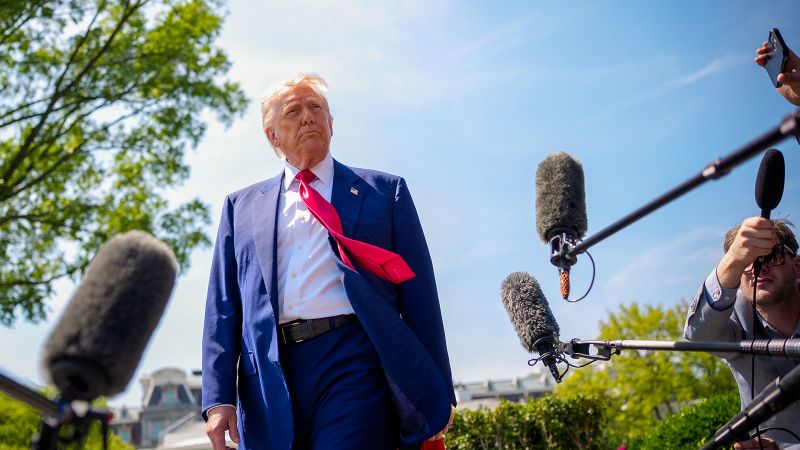CNN
—
So much of what the public knows about President Trump’s chaotic governance stems from robust reporting, including leaks from anonymous sources in the government.
But Trump and his aides are now actively trying to impede this reporting and intimidate news outlets, creating a bleak backdrop to the UN’s recognition of Saturday as World Press Freedom Day.
The chilling effects, while hard to measure, are evident after Trump’s first 100 days in office, according to press freedom groups like the Committee to Protect Journalists and Reporters Without Borders.
“Trump’s second term as president has brought a troubling deterioration in press freedom,” Reporters Without Borders said in a report this week.
If Trump’s first term was marked by hostile rhetoric towards the media, his second term has transformed that rhetoric into an unprecedented campaign of attacks, some straight out of authoritarian countries.
This year, the Trump administration has opened investigations into several broadcast networks, challenged the federal funding of NPR and PBS, blocked the Associated Press from news conferences, and seized control of the White House press pool. All of this has happened while Trump is personally suing news outlets and threatening to sue more.
“These attacks on the media are not random actions. In fact, they are part of the autocratic playbook,” said Joel Simon, head of the Journalism Protection Initiative.
In an especially worrisome development this week, the Justice Department reinstated a rule that allows federal investigators to secretly go after journalists’ records in leak investigations.
The department cited “growing concerns about federal government employees intentionally disseminating confidential, privileged, or otherwise protected information to the media.”
Protections for journalists were put in place by Merrick Garland, the Biden-era attorney general, after Trump-era prosecutors covertly pursued internal communications from several major news outlets, including CNN.
Classified leak probes have long been seen as one of the most serious threats against investigative journalism and the free press in the US.
Attorney General Pam Bondi said she rescinded the ban on targeting journalists because the previous safeguards struck “the wrong balance.”
Prosecutors still must seek approval from Bondi if they want to subpoena a reporter’s communications, including their phone logs or hand-written notes, the regulation says, and investigators should still try to negotiate with the reporter before seeking authorization to issue a subpoena in secret.
However, the Committee to Protect Journalists (CPJ) says Bondi’s decision will have “chilling effects on reporting on the government’s activities and ultimately the public’s right to know.”
Groups like CPJ have historically focused on the dangerous climate for journalists in dictatorships and repressive regimes abroad. But Trump’s political rise has imported those same threats to the US.
Broadly speaking, journalists in the US enjoy expansive rights and freedoms. But a sense of fear is palpable.
In a new report about Trump’s first 100 days, CPJ said it has noticed “a significant increase in the number of newsrooms seeking safety advice, concerned that the changing national political environment could threaten their ability to report without fear of retribution from authorities.”
Retribution has been the perceived motive behind Trump’s moves against the CBS newsmagazine “60 Minutes,” pollster J. Ann Selzer, and international broadcasters like Voice of America.
Just this week, Trump defended his lawsuit against CBS and threatened The New York Times with legal action in the same breath. He also said news outlets that published polls showing his approval rating in decline are “Negative Criminals” who “should be investigated for ELECTION FRAUD.”
His pick for FBI director, Kash Patel, previously expressed interest in punishing some members of the news media. “Yes, we’re going to come after the people in the media who lied about American citizens, who helped Joe Biden rig presidential elections — we’re going to come after you,” Patel said in a 2023 interview with Steve Bannon.
Other Trump appointees have no qualms about being seen as partisan attack dogs. His FCC chair, Brendan Carr, has opened probes into Comcast, Disney and other targets of Trump’s ire. Carr recently took a Hollywood Reporter illustration of himself as an unleashed “media pit bull” and made it his profile picture on X.
Meanwhile, the Trump White House has asserted sweeping power over the FCC and other federal agencies that Congress designed to have independence.
FCC commissioner Anna Gomez, one of the panel’s Democratic dissenters, said on “The Lead with Jake Tapper” this week that the Trump administration is on a “campaign to censor and control.”
Caving just “breeds further capitulation,” she warned. “So my sincere hope is actually that we’ll have courage and that people will stand up and push back.”
For journalists who try to cover every administration impartially, pushing back just means reporting the news without fear or favor, hoping the people who own their media companies continue to support their work.
As veteran editor Tina Brown wrote last month: “Journalists can only be as brave as their bosses allow them to be.”
Hannah Rabinowitz contributed reporting.

